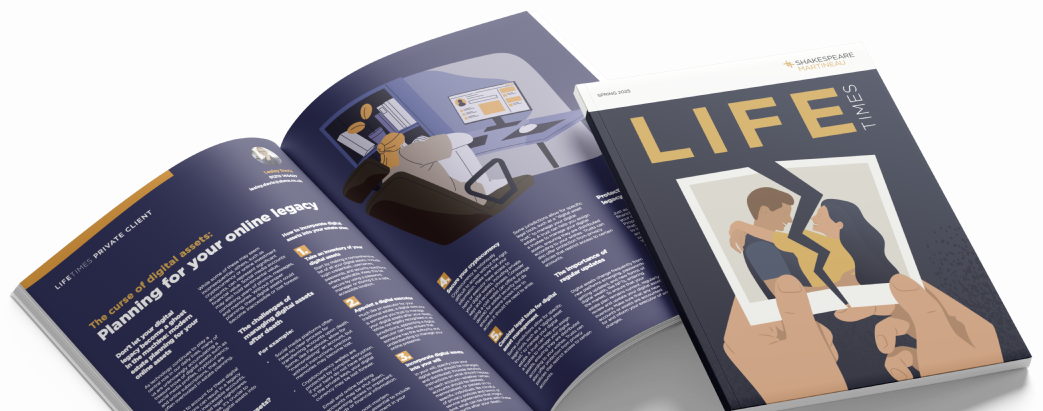Trust Solicitors
Safeguarding your estate for future generations

We take a holistic approach when it comes to advising you about Trusts
Establishing a Trust is often a sensible way to protect your wealth and maintain its value for the benefit of others over a long period of time. It gives you the ability to influence the use of the funds including deciding how to invest the money and benefit your family. Our Trust solicitors can guide you through your options to help you make the best decision for your situation.
What is a Trust?
A trust is a legal arrangement (created either during lifetime or upon death) whereby a person or persons look after assets for another person or persons. Those looking after the assets are known as the trustees and those who have the benefit of those assets are known as the beneficiaries. The person who sets up the trust is known as the settlor.
The key characteristic of a trust is the separation of the legal ownership and the beneficial interest. As far as third parties are concerned, the trustee is the legal owner of the property or asset and the beneficiaries are entitled to expect that the trustees will look after the asset or property for their benefit.
In some circumstances a trust can be used to protect the assets for your own benefit, should you feel you need a helping hand in managing financially. We can help you understand how this will impact on your personal tax affairs and the implications of relinquishing the funds into the hands of your chosen trustees.
We also have the expertise to establish and administer Personal Injury trusts which are often used to ensure means tested benefits are not lost as a result of damages received as a consequence of a successful personal injury claim. We work closely with our Personal Injury team to offer a seamless transition from litigation to thinking about how you will protect and use the hard won compensation.
Having assisted you with establishing your trust, our work doesn’t stop there. Upon their creation, trusts take on their own life and HMRC compliance is crucial. Find out more about how our Trust lawyers can help you below or get in contact with us using the button below.
Read our handy guide: Top ten things to consider before preparing a trust
See our free estate planning guide below, which allows you to download our PDF to read in your own time.
Wherever you are on your journey, our legal advisors can help. Call us today on 0330 024 0333 or complete our contact form.Our Trust team
How our Trust experts can help
Tax & HMRC
We take a holistic approach when it comes to advising you about trusts, we explain the tax and legal characteristics of your particular trust as well as liaise with HM Revenue & Customs to register the trust formally and ensure the appropriate tax returns are completed and filed on the trustees’ behalf on an annual basis and ensuring the ongoing effectiveness as your personal circumstances evolve and tax regulations change.
Trust administration
Administering the Trust on a day-to-day basis, whether in the role of professional Trustee or by assisting you and others in that role to honour your legal obligations.
Working with your trustees
The administrative burden placed on your trustees cannot be underestimated but our legal experts are on hand to provide pragmatic, reasoned and sound advice to ensure your trust works as you intended. We will draft the appropriate documents to record your decisions as well as advising Trustees of their duties to safeguard them against personal liability for Trust mismanage.
Third party advisors
Our experts work alongside award-winning investment management funds meaning we can liaise with third-party advisors such as investment managers to assist you in acquiring the best advice to invest and grow the fund.
Clear and straightforward advice
Our lawyers will guide you through the process of establishing a Trust to ensure it is tailored exactly to your requirements and explain all the tax and legal characteristics of your particular Trust.
Why choose Shakespeare Martineau?
- We are a leading law firm, having helped many clients to protect the financial security of their families through our specialist trust law services.
- Known for our personal touch, we approach dealing with trusts on an individual basis with sensitivity and meticulous attention to detail.
- If you’re unsure about any aspect of your trust, our team has all of the expertise you need and will always be on hand to advise you on a range of issues, from tax considerations to the use of protective Trusts.

Trust frequently asked questions
The main difference between a trust and a will, is that a trust can be set up during your lifetime or upon your death, whereas a will is only in force upon your death.
A trust is a document, or set of circumstances, whereby a person or persons looks after an asset or assets on behalf of others.
A will is a document that governs the management and distribution of your estate after your death. It sets out who will deal with your estate (your executors) and how the estate is to be distributed. The executors of your will are also trustees of the assets in the estate (on behalf of the beneficiaries) under the will. The terms ‘executor’ and trustee’ are often used interchangeably in these circumstances. Read more about wills and the importance of succession planning.
A will trust is simply a trust that has been set up by your will, rather than a trust set up during your lifetime. A will trust is often used to try to protect or to control assets, for example, you might use a will trust to ensure that your children inherit some of your estate in the future, but also to ensure that your spouse has sufficient income and access to assets during his or her life.
The executors of your will might be the trustees of the trust, or you may choose to have different trustees.
There can be inheritance tax benefits to leaving certain assets in a discretionary trust in your will, rather than leaving them to other beneficiaries. Or it might be that you want to control the distribution of your assets to certain beneficiaries only if your trustees think they will be responsible enough to manage the funds left to them. A will trust enables you to put in place these types of structures, conditions and control.
There are lots of different reasons you might set up a trust. Some common examples are:
- For inheritance tax planning
- To control assets
- When somebody is too young or too vulnerable to look after their own assets
- To protect assets from means-testing if the money going into the trust results from an award of compensation following a personal injury
- To protect assets if you feel the beneficiary doesn’t have the sufficient skills to invest and look after them wisely
- To pass on assets when you die (a will trust)
- To deal with an estate when somebody dies without a will (known as intestacy).
There are many different types of trust, but the main ones are:
- Bare trust – this is a very simple trust whereby the trustee simply looks after the asset on behalf of the beneficiary. The asset will form part of the estate of the beneficiary and the beneficiary has the right to all of the income and capital (providing they are over the age of 18).
- Interest in possession trust – with this type of trust, the beneficiary is entitled to the income arising from any asset e.g. bank interest, share dividends or rental income. For example, you might leave your spouse a life interest in the residue of your estate in your will – this means that they have a right to the income from the assets, but that they do not own the underlying asset themselves – instead this is left to another beneficiary.
- Discretionary trust– with this type of trust you leave the distribution of the trust (income, capital or both) to the discretion of the trustees. Quite often the settlor of the trust will leave a memorandum of wishes to accompany the trust as to how they envisage the trust being distributed.
- Personal injury trust – if you have been awarded compensation because of a personal injury then this type of trust can shield the compensation monies from means-testing for state benefit purposes in the future.
- A trust for a vulnerable person – these types of trust qualify for special tax treatment if the beneficiary of the trust is vulnerable, i.e. a person who is under 18 years of age or a person with a disability and receives certain means-tested benefits.
What our clients say about us
How the Trust process works
Not everyone is aware of how the process of engaging Trust solicitors works, so we’ve provided an overview below to give you some peace of mind
-
The first stage is to get in touch with us using the button below – you will then be assigned to one of our Trust specialists. Alternatively, you can reach us on 0330 024 0333.
-
You’ll then receive a free 15-minute consultation within 24 hours via Zoom or telephone to discuss the issues you’re facing.
-
You are then provided with a transparent breakdown of our costs and, if you would like to proceed, we send you a pack of onboarding documents
-
Following this, we will guide and support you through the process of achieving a resolution that works for you and your family.
Download our free estate planning guide today!
Our guide features the following information to help you in the following areas:
- The benefits of estate planning include wealth preservation, control over assets, avoiding intestacy, protecting vulnerable beneficiaries, business succession, and peace of mind.
- A comprehensive checklist of the documents you will need for estate planning, such as a will, a lasting power of attorney, a trust deed, and a letter of wishes.
- General guidance for different scenarios, such as homeowners, young families, unmarried couples, high net worth families, family businesses, and elderly parents.
- How Shakespeare Martineau can help you with estate planning and what it will cost, as well as providing some important words, helpful resources, and contact details.
After filling out your information, you will receive a PDF guide that you can access anytime, whether you are on the move or have some spare time to review it.
If you’d like to speak to a member of our team, please fill out the enquiry form. We will aim to reply to your query within 2 hours
Need to talk to someone sooner? You can call use at the number below
Call Us: 0330 024 0333
Featured Wils, Trusts, Estates services
Inheritance and Trusts Disputes
If you feel that a family member’s wishes have not been fulfilled, or you haven’t received what is rightfully yours, our specialist team can help you resolve your dispute, whether that is through mediation or negotiation, or court proceedings.
Wills and probate
It can be difficult to envisage a time when you’re not there to provide for your family. However, we are here to guide and support you with preparing a will so your wealth is protected for your loved ones into the future.




















